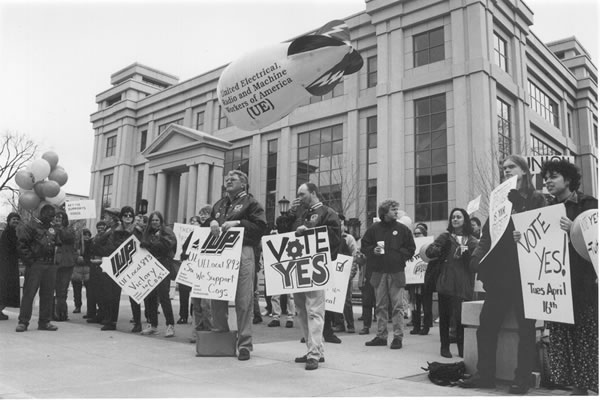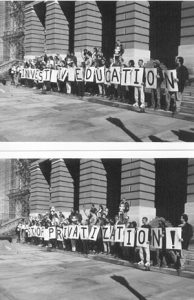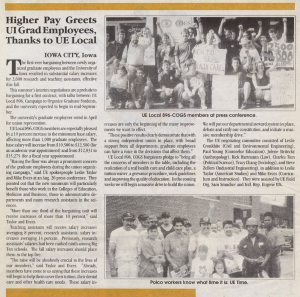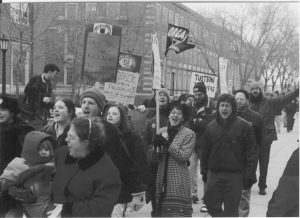
As tenure track positions have disappeared, universities have turned to graduate employees as a source of cheap part-time labor. Graduate employees at the University of Iowa are now responsible for over 50% of the hours undergraduates spend with instructors. This shift, away from tenured faculty towards increasing dependence on graduate assistants and adjunct faculty, has been a result of downsizing and the “corporatization” of universities across the country.
The Beginnings of Change at UI
 In response to these structural changes in higher education, graduate employees at the University of Iowa organized the Campaign to Organize Graduate Students (COGS) in the spring of 1993. COGS members joined together to fight for a voice in determining their working conditions. They quickly focused on securing better health care, fair salaries, tuition waivers, and a grievance procedure for graduate employees.
In response to these structural changes in higher education, graduate employees at the University of Iowa organized the Campaign to Organize Graduate Students (COGS) in the spring of 1993. COGS members joined together to fight for a voice in determining their working conditions. They quickly focused on securing better health care, fair salaries, tuition waivers, and a grievance procedure for graduate employees.
In the fall, COGS voted to affiliate with the Service Employees International Union (SEIU). Over the next six months COGS/SEIU mobilized hundreds of graduate employees and, in the spring of 1994, over 600 graduate employees voted YES for the Union, just 70 votes short of a victory.
Organizing the path to success
Despite this electoral defeat, COGS’ organizing efforts led to improved working conditions for graduate employees. In response to the COGS campaign, the administration raised graduate employee salaries, began for the first time to contribute a small amount toward heath insurance, and increased funding for child care. In the fall of 1995, members voted to affiliate with the United Electrical, Radio, and Machine Workers of America (UE).
 During the year, hundreds of COGS activists recruited a membership of over 1200. In the spring of 1996, the combined efforts of graduate employees and their allies led to a resounding COGS victory of 949 YES votes to 667 NO votes, making UE Local 896-COGS the official bargaining agent for over 2600 graduate employees at the University of Iowa. Immediate victories, even prior to the start of contract negotiations with the administration, came when the union’s grievance committee began to represent graduate employees and the union reached an agreement with the university to raise base salaries from $10,500 to $12,500 for half-time academic year appointments.
During the year, hundreds of COGS activists recruited a membership of over 1200. In the spring of 1996, the combined efforts of graduate employees and their allies led to a resounding COGS victory of 949 YES votes to 667 NO votes, making UE Local 896-COGS the official bargaining agent for over 2600 graduate employees at the University of Iowa. Immediate victories, even prior to the start of contract negotiations with the administration, came when the union’s grievance committee began to represent graduate employees and the union reached an agreement with the university to raise base salaries from $10,500 to $12,500 for half-time academic year appointments.
From Campaign to Local Union: The First Contract
 Throughout the 1996-97 academic year, COGS members continued to pressure the University for a fair agreement. Special actions included a “grade-in” to demonstrate the critical role of teaching assistants and a Martin Luther King Day protest of the administration’s refusal to include a no-discrimination clause in the contract. Despite this protest, the University held fast in its refusal to discuss discrimination language at the bargaining table. While deeply disappointed and shocked by this hypocrisy, COGS members did approve a first contract which included several important victories: a solid grievance procedure; an affordable, comprehensive health care plan (UIGradCare); guaranteed base salaries; and fair policies on such issues as appointment letters, sick leave, family illness and bereavement leave, work rules, and time off over inter-session break.
Throughout the 1996-97 academic year, COGS members continued to pressure the University for a fair agreement. Special actions included a “grade-in” to demonstrate the critical role of teaching assistants and a Martin Luther King Day protest of the administration’s refusal to include a no-discrimination clause in the contract. Despite this protest, the University held fast in its refusal to discuss discrimination language at the bargaining table. While deeply disappointed and shocked by this hypocrisy, COGS members did approve a first contract which included several important victories: a solid grievance procedure; an affordable, comprehensive health care plan (UIGradCare); guaranteed base salaries; and fair policies on such issues as appointment letters, sick leave, family illness and bereavement leave, work rules, and time off over inter-session break.
Strengthening the Union and Making Gains: 1999
Thanks in part to pressure from COGS members for a voluntary settlement, a second contract agreement was reached just days before the deadline to submit the contract to arbitration. Approved overwhelmingly by a membership ratification vote in February 1999, the 1999-2001 contract added: inexpensive dental and mental health care, base salary increases, clarifications of summer pay rates, a memorandum providing for union representation in cases of workplace discrimination, and, for the first time, a 70% contribution from the University towards the cost of health care coverage for employees’ families. Child care pressure undoubtedly played a role in achieving the family health care contribution.
Left: COGS members and allies grade the working conditions at the university. Right: COGS marching in winter rally.
An Established Union Holds Strong: 2001
Although the Bargaining Committee spent an exhausting month discussing tuition waivers with the University, the University was ultimately unwilling to agree to a fair tuition waiver plan. COGS made important gains such as same-sex domestic partner health insurance coverage, increased employer contributions to health and dental care premiums, a 70% employer contribution to dependent dental coverage in the second year of the contract, the inclusion of outpatient substance abuse coverage, a 4% raise for returning employees, and improved language regarding appointment letters.
Tuition Scholarships for All: 2002-2003
For the first time ever, COGS secured an acceptable partial tuition remission plan for graduate employees.
A pair of significant victories came in 2004 when COGS filed and successfully won two overwork grievances. In both cases, the affected employees won hundreds of dollars of back pay and the affected classes were restructured to keep workload within the appointment percentage. During this time, COGS stewards and members also vociferously defended their contract, successfully beating back attempts to ignore sick leave and paid leave rights by the UI.
Net Compensation Gains and Job Security: 2004-2005
As negotiations for the fifth contract began in the Fall of 2004, COGS members were determined to make gains in the areas of tuition scholarships, salaries, and job security. After months of bargaining and member action, the fifth contract was settled in the Spring of 2005. The University’s concessionary demands on health insurance had been warded off. Increases in pay and tuition scholarships enlarged average graduate employee net compensation (take-home-pay) by more than 6%. In addition, new language was crafted that committed departments to honoring initial offers of employment length, gave employees the right to grieve below standard evaluations, and required departments to provide employees written descriptions of their duties and associated time expectations.
Contract Victories and Increased Net Compensation: 2006-2007
UE-COGS started the Fall of 2006 with a significant arbitration victory preserving the right to University-provided training for hundreds of international graduate assistants. The University threatened to appeal this decision to get it overturned, but COGS members held firm and expressed their outrage over this disregard for the negotiated arbitration procedure.
 UIGradCare was expanded so that graduate assistants could use any doctor in the UIHealthCare System for their primary care instead of being confined to Student Health Service. With the new contract, take-home-pay for graduate assistants increased by over 6-22%, depending on appointment and number of credit hours enrolled.
UIGradCare was expanded so that graduate assistants could use any doctor in the UIHealthCare System for their primary care instead of being confined to Student Health Service. With the new contract, take-home-pay for graduate assistants increased by over 6-22%, depending on appointment and number of credit hours enrolled.
On many campuses, university administrations have attempted to prevent union campaigns by asserting that teaching and research assistants are “not employees.” Created especially for the UE-COGS campaign by UE cartoonist Gary Huck, this cartoon made the point that graduate employees do work for their paychecks… and that workplace problems cannot be solved simply through “collegiality,” as was asserted by the university’s Graduate College.
UE-COGS Proud History of Salary Increases at the UI
|
Year
|
Minimum Half-Time Academic Year Salary
|
Negotiated Increase
|
|
1995-1996
|
$10,500
|
—
|
|
1996-1997
|
$12,500
|
19%
|
|
1997-1998
|
$12,778
|
2%
|
|
1998-1999
|
$13,320
|
4%
|
|
1999-2000
|
$13,720
|
3%
|
|
2000-2001
|
$14,130
|
3%
|
|
2001-2002
|
$14,718
|
4%
|
|
2002-2003
|
$15,330
|
4%
|
|
2003-2004
|
$15,330
|
0%**
|
|
2004-2005
|
$15,490
|
1%**
|
| 2005-2006 |
$15,736
|
1.5%
|
| 2006-2007 |
$15,985
|
1.5%
|
| 2007-2008 |
$16,277
|
1.8%
|
| 2008-2009 |
$16,574
|
1.8%
|
| 2009-2010 |
$16,575
|
0%#
|
| 2010-2011 |
$16,575
|
0%#
|
| 2011-2012 |
$16,908
|
%
|
| 2012-2013 |
$17,330
|
%
|
| 2013-2014 |
$17,680
|
%
|
| 2014-2015 |
$18,080
|
%
|
| 2015-2016 |
$18,261
|
%
|
| 2016-2017 |
$18,809
|
%
|
| 2017-2018 |
$19,225
|
%
|
| 2018-2019 |
$19,628
|
%
|
| 2019-2020 |
$20,040
|
%
|
| 2020-2021 |
$20,301
|
%
|
| 2021-2022 |
$20,565
|
%
|
| 2022-2023 |
$21,329
|
%
|
| 2023-2024 |
$21,969
|
%
|
| 2024-2025 |
$22,068
|
%
|
Since 1996-1997, UE-COGS has increased minimum salaries by 48%.
** In the 2003-2005 contract UE-COGS achieved a partial tuition scholarship for all TAs and RAs as a way to counter incredibly high increases in tuition. For this contract, the membership agreed to put more money into the new scholarship benefit than into salaries as a way to protect net take-home pay. Currently, the minimum tuition scholarship is the equivalent of 25% of the cost of tuition. To illustrate, if an employee in 2003-2004 received the minimum salary of $15,330 and returned in 2004-2005 with a salary of $15,490 plus the 25% tuition scholarship, their net take home pay will have increased by 4%.
#In the 2009-2011 contract UE-COGS negotiated what was thought to be a full tuition scholarship for all TAs and RA beginning in 2010-2011. It was negotiated at a dollar amount, and the cost of tuition increased beyond that allocated in the contract. In the 2011-2013 contract, 100% tuition is now covered at the College of Liberal Arts and Sciences tuition rate.

